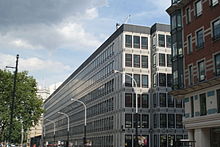Department for Business, Innovation and Skills
 | |
 | |
| Department overview | |
|---|---|
| Formed | 5 June 2009 |
| Preceding Department |
|
| Dissolved | 14 July 2016 |
| Superseding agency |
|
| Jurisdiction | United Kingdom |
| Headquarters | 1, Victoria Street, London |
| Annual budget | £16.5 billion (current) and £1.3 billion (capital) for 2011-12 [1] |
| Child agencies |
|
| Website | www.gov.uk/bis |
| This article is part of a series on |
| Politics of the United Kingdom |
|---|
 |
|
The Department for Business, Innovation and Skills (BIS) was a ministerial department of the United Kingdom Government created on 5 June 2009 by the merger of the Department for Innovation, Universities and Skills (DIUS) and the Department for Business, Enterprise and Regulatory Reform (BERR). It was disbanded on the creation of the Department for Business, Energy and Industrial Strategy on 14 July 2016.[2]
Secretaries of State for Business, Innovation and Skills[]
| Name | Portrait | Took office | Left office | Length of term | Political party | Prime Minister | ||
|---|---|---|---|---|---|---|---|---|
| The Lord Mandelson | 
|
5 June 2009 | 11 May 2010 | 11 months and 6 days | Labour | Gordon Brown | ||
| Vince Cable | 12 May 2010 | 12 May 2015 | 5 years | Liberal Democrats | David Cameron (Coalition) | |||
| Sajid Javid | 
|
12 May 2015 | 14 July 2016 | 1 year, 2 months and 3 days | Conservative | David Cameron (II) | ||
The Permanent Secretary was Sir Martin Donnelly.
Responsibilities[]
Some policies apply to England alone due to devolution, while others are not devolved and therefore apply to other nations of the United Kingdom. The department was responsible for UK Government policy in the following areas:[3]
- business regulation and support
- company law
- competition
- consumer affairs
- corporate governance
- employment relations
- export licensing
- further education
- higher education
- innovation
- insolvency
- intellectual property
- outer space
- postal affairs
- regional and local economic development
- science and research
- skills
- trade
- training
Devolution[]
Economic policy is mostly devolved but several important policy areas are reserved to Westminster. Further and higher education policy is mostly devolved. Reserved and excepted matters are outlined below.
Scotland
Reserved matters:[4]
- Competition
- Customer protection
- Import and export control
- Insolvency
- Intellectual property
- Outer space
- Postal services
- Product standards, safety and liability
- Research councils
- Telecommunications
- Time
- Business associations
- Weights and measures in relation to goods
The Scottish Government Economy and Education Directorates handle devolved economic and further and higher education policy respectively.
Northern Ireland
Reserved matters:[5]
- Consumer safety in relation to goods
- Import and export controls, external trade
- Intellectual property
- Postal services
- Telecommunications
- Units of measurement
Excepted matter:[6]
- outer space
The department's main counterparts are:[7]
- Department of Enterprise, Trade and Investment (general economic policy)
- Department for Employment and Learning (employment relations, further and higher education policy)
Wales
Under the Welsh devolution settlement, specific policy areas are transferred to the Welsh Government rather than reserved to Westminster.
This section needs expansion. You can help by . (June 2010) |
References[]
- ^ Budget 2011 (PDF). London: HM Treasury. 2011. p. 48. Archived from the original (PDF) on 1 August 2011. Retrieved 30 December 2011.
- ^ Prime Minister's Office: Changes to the machinery of Government Archived 8 June 2009 at the Wayback Machine
- ^ "Department for Business, Innovation and Skills". gov.uk. Retrieved 18 July 2016.
- ^ "Scotland Act 1998, Schedule 5, Part II". Opsi.gov.uk. Retrieved 4 December 2012.
- ^ "Northern Ireland Act 1998, Schedule 3". Opsi.gov.uk. 25 June 1998. Retrieved 4 December 2012.
- ^ "Northern Ireland Act 1998, Schedule 2". Opsi.gov.uk. 25 June 1998. Retrieved 4 December 2012.
- ^ "Departments (Transfer and Assignment of Functions) Order (Northern Ireland) 1999". Opsi.gov.uk. 5 October 2012. Retrieved 4 December 2012.
External links[]
Precursor departments:
- Department for Business, Innovation and Skills
- Business in the United Kingdom
- Defunct departments of the Government of the United Kingdom
- Education ministries
- Government agencies disestablished in 2016
- Innovation in the United Kingdom
- Ministries established in 2009
- Science and technology ministries
- 2009 establishments in the United Kingdom
- 2016 disestablishments in the United Kingdom
